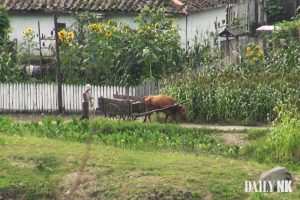There has been an increase in the deaths of working cows in North Korea, which has led to a prevalence of cattle theft from farms to replace the deceased animals, Daily NK has learned.
A source based in South Pyongan Province told Daily NK on Sunday that “many cows are dying with the approach of spring” and that “around 120 cows died in the last month alone, according to data from the agricultural management committee in South Pyongan Province.”
According to the source, the investigation showed that malnutrition “caused 75% of the cases of cattle mortality, with the rest being caused by accidents and disease.” He further explained that “the main cause of death for the cows was the lack of food and hay despite the cold winter weather.”
Cows generally go through a process of active metabolization to regulate their body temperatures in cold weather. By converting nutrients into heat energy through feeding, they can maintain a healthy body temperature. This means that a cow will eat more as the weather gets colder. The increase in deaths can be attributed to the lack of energy to cope with the cold temperatures due to insufficient food supplies and a reduced immune system from a lack of adequate nutrition.

“[Farmers] are feeding them dog or cat meat, pumpkin soup and glutinous rice to replenish their remaining working cows with nutrients,” the source said. “However, locals are accusing the [the farmers] of merely trying to fix the problem after the damage has already been done.”
In North Korea, the so-called burimso, or working cows, are considered state property managed and controlled by work teams in each collective farm. As a result, a work team will be reprimanded for failing to properly manage state property if a working cow dies. There is also the potential for additional problems that can cause adverse effects on farming, such as the shortage in cattle making it difficult to achieve target production outputs.
The source said that “theft of cows [from other farms] in order to fill the cattle shortage has increased ahead of the farming season, and some [of the offenders] have been caught and punished.”
“A while ago, the team leader of a work unit at a farm in Pyongsong told [a farmer] he would give him 50 kilograms of corn if he brought back a stolen cow,” the source said. “The farmer attempted to steal a cow from another farm, but was caught and punished for stealing state property.”
Article 91 of North Korea’s Criminal Code stipulates up to one year of hard labor as punishment for theft of state property.
Some people faced with economic hardships are stealing cows from other farms despite the risk of punishment. This is leading to a vicious cycle where private citizens or cooperative farms who have lost their cows go ahead with stealing cows from other farms.
Daily NK reported last month (article in Korean) on the prevalence of thefts of working cows in North Korea. There is a likelihood that this was related to the mass cattle death.
The increase in cattle theft also appears to be part of a broader issue of forcing individuals to solve social problems neglected at the national level.
*Translated by Vilde Olaussen

















